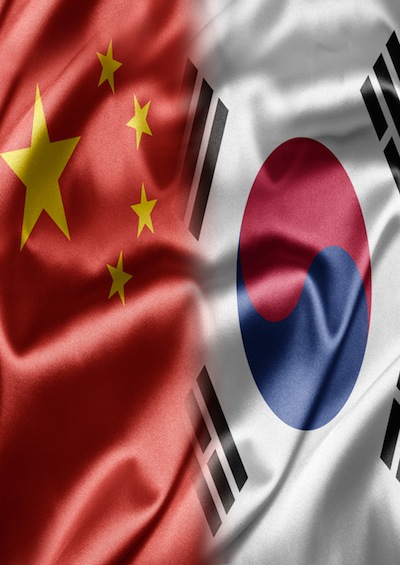China-South Korea: Misguided Romance in East Asia?
Just how serious is this fledgling romance between Seoul and Beijing?
September 11, 2014

Knowing who your friends are isn’t always easy, especially when it comes to diplomacy. At the same time, the stakes in shaping friendships in East Asia have not been as high as they are now since at least the end of the Second World War.
There undoubtedly is a bitter chill in the air when it comes to South Korea’s relations with Japan. But while Seoul’s ties to Tokyo may be prickly at best, South Korea’s relations with Beijing are beginning to blossom.
Meanwhile, both Japan’s Prime Minister Shinzo Abe and South Korea’s President Park Geun-hye have been in power for nearly two years. Even so, they have not yet had a face-to-face talk.
Worse, they have no plans to do so any time soon. That is a strange situation, not least because both countries consider themselves faithful U.S. allies.
In contrast, China’s President Xi Jinping visited Seoul in July, marking the two presidents’ fifth face-to-face meeting. Following the latest summit discussion, the two sides announced that they aim to conclude a bilateral free trade agreement by the end of this year which would bolster two-way trade to $300 billion.
But just how serious is this fledgling romance between Seoul and Beijing? And how will it affect the two countries’ neighbors?
A double-edged sword for Seoul?
The possibility of a free trade agreement between South Korea and China soon would certainly strengthen ties between the world’s second-largest economy and one of the region’s most economically robust nations.
But will what is an obvious boon for growth for both sides in the near term potentially be a double-edged sword for Seoul, as it navigates the choppy waters of diplomatic relations?
For one, there is concern in the international community that a trade pact between China and South Korea would further strengthen ties between the two countries that have increasingly been able to set aside their differences as they eye issues of mutual interests. This, in turn, may give further clout to China.
Apart from enhancing trade relations, Beijing and Seoul are also working to allow a direct exchange of the Chinese yuan and Korean won. That would bolster the Chinese currency’s status on the global stage.
Closer relations between South Korea and China are a telltale sign that U.S. influence in the region is waning, especially on the economic front.
The fact that the United States has not been able to move forward in its trade efforts in Asia, via the Trans-Pacific Partnership (TPP) agreement, contrasts sharply with Beijing’s ability to bolster its own influence in the region.
The US drags its feet and China pushes on
This is all the more significant as the TPP is the sole multilateral trade agreement that the United States is negotiating in the world’s most economically robust region.
And while the pact ambitiously hopes to set new global trading standards, bickering within the U.S. Congress and spats over tariffs on a slew of politically sensitive products from rice to cars have kept the 12 TPP member nations from coming anywhere near an agreement any time soon.
As for China, it is not part of the TPP negotiations, but it continues to be actively involved in pushing for an alternative regional trade regime in the form of the Regional Comprehensive Economic Partnership agreement. This envisaged agreement includes South Korea and Japan, but notably not the United States.
Under those circumstances, it is hardly surprising that ever-growing economic ties between Beijing and Seoul are worrying many in Washington. They fear that it will lead to broader cooperation between the two countries, including on security issues.
Japan as a spoiler?
That, however, can be an opportunity for Tokyo to muscle in and play up to Washington’s worries. Closer Sino-Korean ties are certainly being viewed with concern in Japan. South Korea’s latest moves are seen as putting the break on the once much-hoped for trilateral trade agreement between China, South Korea and Japan.
On the other hand, a rapidly intensifying relationship between Seoul and Beijing can also be used by Tokyo as an opportunity to push forward an understanding in Washington that Japan remains the single most reliable and effective ally for the United States in the Asia-Pacific region – and the one that will not waver toward China.
For Seoul, though, the fact remains that its attraction to Beijing is a pragmatic one, based in large part on economic interests. After all, as is the case with Japan, South Korea’s military alliance with the United States remains at the heart of its security strategy.
And South Korea’s free trade agreement with the United States two years ago is viewed as a cornerstone of success in furthering its foothold as an economic powerhouse. From that perspective, the rapprochement with China may simply be understood as a rounding out of South Korea’s options.
Who will benefit most?
However, there is also a sense of caution in Seoul over the fact that any trade deal with Beijing would ultimately primarily benefit China, as Korea’s reliance on Beijing’s economic might simply continues to grow.
To balance against such dependence, closer ties between Japan and South Korea would be important strategically.
They would provide not only greater regional stability (to offset the rise of China’s military presence as well as continued threats from North Korea), but they would also provide for economic expansion in the longer term.
For that to happen, Tokyo and Seoul have to overcome their longstanding animosities. Economic expansion is no longer the single biggest driving force in East Asia.
Rather, ensuring political clout that matches their economic prowess is equally important for Japan and South Korea as well as China. Such rivalry, though, can be fraught with tension.
Setting aside differences regarding history in particular is no easy task, but it would make a great deal of sense for both sides to focus on their common interests, not to mention joint values.
Both Japan and South Korea need political stability above all else to ensure continued economic growth. Both nations also face similar challenges of securing energy resources, dealing with a decreasing population and redefining strategies that would secure longer-term economic expansion.
They are also confronting the challenge of China’s rise and North Korea’s uncertain outlook.
By working together to confront mutual challenges head-on, it would also make U.S. alliances in the Asia-Pacific stronger, as well as ensure greater stability in the region. The key question, though, is whether the political leaders of Japan and South Korea will manage to get closer to each other.
Much is happening in Asia, not least the warming of relations between India and Japan. It would be unfortunate for regional balance if Japan and South Korea did not find the path to warmer ties.
Takeaways
Closer relations between South Korea and China are a telltale sign that US influence in the region is waning.
China is not part of the TPP negotiations, but it continues to push for an alternative regional trade regime.
Ever-growing economic ties between Beijing and Seoul are worrying many in Washington.
Washington understands that Japan is the most reliable and effective ally for the US in the Asia-Pacific region.

